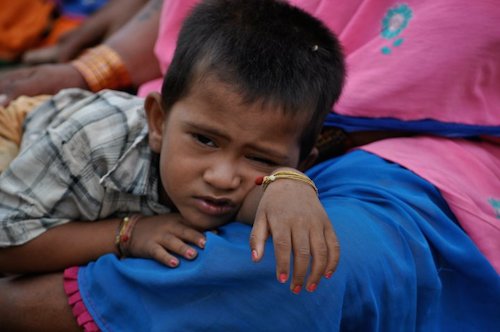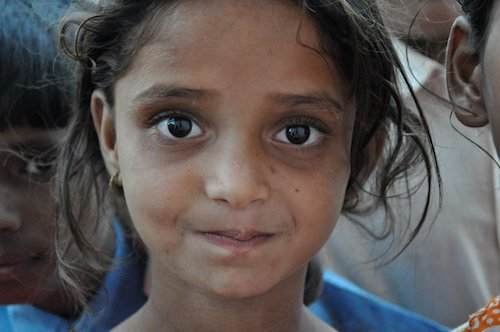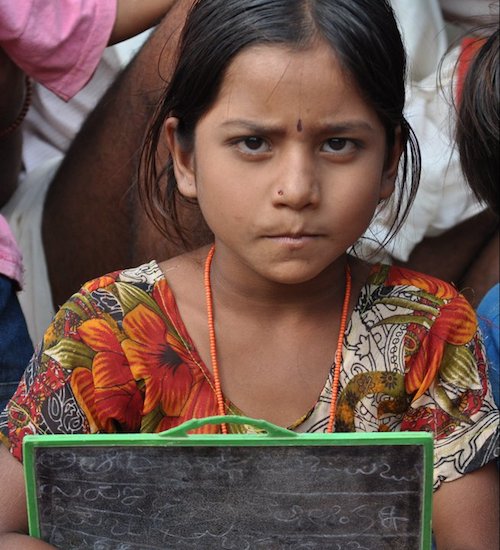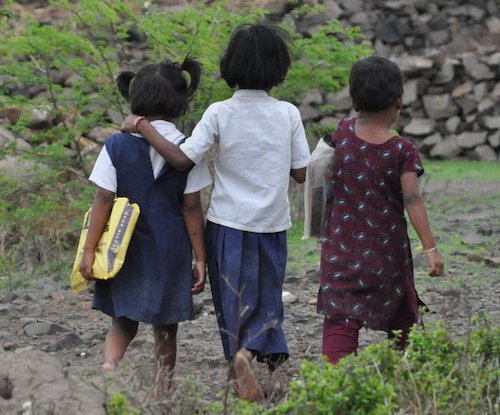Can words hurt as much as sticks and stones?
“Sticks and stones will break your bones, but words will never hurt you.”
These words ring through my head as my new friend hangs her head and cries. She is devastated.
My friend attends a school run by those who seem to be more fortunate. She attends school for free in a nation where free is synonymous with poor quality and any kind of quality education costs at least a small sum. This young girl walks to school everyday in her hand-me-down uniform and devours her school lessons. She speaks English, a language she taught herself, better than her teachers. Sometimes she skips school because the streets of Varanasi hold more interest than the tired worksheets that are levels and levels below her intellect. There is no such thing as “differentiated instruction” where she goes to school. People tease her for her “hand out” education” but still she shows up, still she finishes her homework, and still she practices her English with anyone who will listen. Despite her poverty, she offers her help to anyone she considers a friend and flatly refuses compensation, even if she knows such a decision will earn her the ire of her older sister. This little girl, who owns no toys, says she believes she will always get what she needs from the universe, even if it is only a very, very little bit. She possesses the drive and exudes the potential that everyone raising money for a school like hers talks about.
But at school today, she was humiliated.
Today my friend’s teacher reminded her of her “place” and delivered a lesson on class structure that included telling a little girl that she should be “happy for what she gets”. All because my friend expressed a preference for one donated item over another.
As she cries next to me, I am reminded of the phrase I heard so often in my youth and wonder if whoever made it up had ever had anyone repeatedly tell them they were “less than” and undeserving of exhibiting normal human behaviors?
“Why can’t I have a favorite color? Why can’t I have an opinion? Why does everyone hate me because I am poor?”, she says as she kicks a stone. She can’t, for the life of her, understand why being poor should make her a blank canvas, devoid of all opinion, preference, and choice. Frankly, I don’t understand it either.
 As I sit with her, I notice the boy down the street being all but broom swept out of a store as the owner calls him a string of names in Hindi. A tourist couple are discussing the touts in town in less than flattering terms, with smiles on their faces, and not fooling any of them. Another traveling pair was sitting next to me last night and trying to engage me in, what seems like, the never ending discussion on “terrorists”. Several tourists have visited my young friend’s school and come out raving about the “wonderful” work being done for these children who have “nothing” and have “horrible home lives”. The beat red cheeks of the children over-hearing these comments tells me that many of them didn’t know they had horrible families until this very minute.
As I sit with her, I notice the boy down the street being all but broom swept out of a store as the owner calls him a string of names in Hindi. A tourist couple are discussing the touts in town in less than flattering terms, with smiles on their faces, and not fooling any of them. Another traveling pair was sitting next to me last night and trying to engage me in, what seems like, the never ending discussion on “terrorists”. Several tourists have visited my young friend’s school and come out raving about the “wonderful” work being done for these children who have “nothing” and have “horrible home lives”. The beat red cheeks of the children over-hearing these comments tells me that many of them didn’t know they had horrible families until this very minute.
Words hold meaning and words have weight. As I look down at my young friend, beaten by words, I wonder why anyone thinks their words do not matter. And then I start to take stock of my own language. Language flows from our lips to someone else’s ears and into their hearts. If we do not choose out words carefully, they take on a life of their own. Have I had a small part in creating a world where words can be hurled like stones, aimed to leave a sting and a bruise? Have I myself used words that have hurt, whether I meant to or not? If I admit that words do, in fact, hurt, do I not have an obligation to work to do better?
When we humiliate a child in class, even verbally, we break them a little. But it’s bigger than that. When we call people we don’t know terrorists, when we mimic accents that aren’t ours, when we try to justify our stereotypes of Africans, Pakistanis, and Italians, when we tell fellow travelers to expect the worst from the world’s poor, when we refuse to acknowledge cultural differences and bad mouth people we met once, when we tell stories that generalize a nation or a people based on a single experience, when we allow our entertainment industry to export a narrow definition of beauty, when we tell racist jokes, when we use words like “cute”, “frigid”, or “bitch” to describe a powerful woman- when we say these things we break people too, even if just a little bit. And, just as bad, we set people up to treat other people poorly based on preconceived notions, misconceptions, assumptions, and a lack of cultural awareness. We perpetuate the notion that it’s ok to verbally take someone down as long as you don’t throw those “sticks and stones”- that it is somehow not as bad.
The little girl sitting next to me is economically poor, no getting around it. She sure she is “less than” after being told by teachers, tourists, peers, shop keepers, and police officers that she is just that. She has grown up in a world where words saying she is too brown, too poor, and too female to be “right” have been repeated over and over and over. Words have most certainly hurt her. Today was just the latest in a barrage of ignorance thrown at her due to things far beyond her control, mindsets rooted in ignorance and hate passed down from long ago. But somewhere in her she also still believes that they are wrong. She has not accepted the box they have created for her. She looks at me with her hurt in her eyes and silently asks me to tell her is is not “less than”. She does not accept the words but they still sting. Her tears pour out and I wonder how many little girls are sitting on curbs, in blue hand-me-down uniforms, crying over words that weren’t supposed to hurt?




Category: Ethics